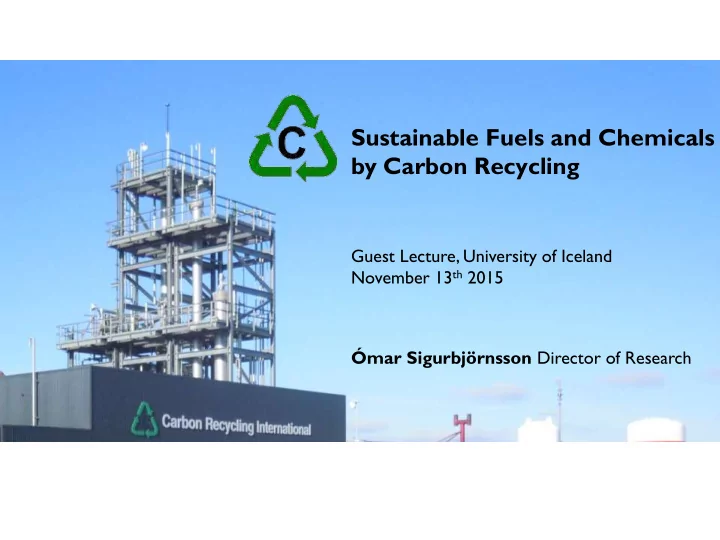

Sustainable Fuels and Chemicals by Carbon Recycling Guest Lecture, University of Iceland November 13 th 2015 Ómar Sigurbjörnsson Director of Research
Source of our Carbon – Fossil Hydrocarbons Coal Oil Natural Gas World Consumption 3.9 4.2 3.1 Gtoe/year Reserves/Production years 110 52 54 toe= tons of oil equivalent Source: BP Statistical Review of World Energy 2015 Carbon Recycling International 2
Global GHG impact from human and natural activity 2.1 Gt C = 7.7 Gt CO 2 = 1 ppm CO 2 in atmosphere +15 Gt/yr -17 +32 -11 -6 25% Transport +32 +439 +332 -450 -338 All numbers in billions of tons CO 2 Industry, agriculture and transport Nature on land Oceans Source: UN IPCC / IEA Carbon Recycling International 3
How can we reduce carbon emissions? Low carbon renewable energy sources! Wind, Solar, Hydro, Geothermal Increased efficiency & lower consumption Biomass utilization Carbon Capture and Sequestration (CCS) Carbon Capture and Utilization (CCU)? Carbon Recycling International 4
Where will we continue to need carbon? Smelting: Iron, Steel, Aluminum, etc. Carbon needed for reduction of ore Organic Chemicals and Plastics methanol, ethylene, propylene, butadiene, benzene, toluene, and xylenes Fuel for Trucks, Ships and Airplanes Liquid energy carriers needed for their high energy density Carbon Recycling International 5
Can we replace fossil carbon with biomass? Replacing 5 Gigatons C with biomass (assuming 50% carbon in biomass) gives: Carbon conversion Biomass needed Land requirement efficiency annually 100% 10 Gigatons 3 Million km 2 50% 20 Gigatons 6 Million km 2 25% 40 Gigatons 12 Million km 2 Iceland is 103.000 km 2 Europe covers around 10 million km 2 IEA 2011: 27% transport fuel from Biomass in 2050 Requires: 3 Gigatons of Biomass and 1 million km 2 Carbon conversion efficiency and recycling is critical! Carbon Recycling International 6
Emission-to-Liquids – Power-to-Fuel Atmosphere Renewable power CO 2 CO 2 , H 2 O e - Transportation Industry CO 2 + H 2 Methanol Raw materials CRI Emissions-to-Liquids Carbon Recycling International 7
Brief history of CRI 2007 2008 2009 2010 2011 2012 2013 2014 2015 Company T echnology Pilot plant Plant Plant Plant First sales Plant Marketing of launched in development production engineering construction opening (exports and expanded technology & Reykjavik with 1,300 domestic) to 4,000 t/yr partnerships t/yr capacity Methanex capacity Investment largest by Geely methanol owner of provider Volvo Cars invests Carbon Recycling International 8
Plant capacity 5,400 t/yr CO 2 4,000 t/yr Methanol `~12 t/day ISCC Plus Certified Gas conditioning Chemical reaction Carbon dioxide (CO 2 ) Hydrogen (H 2 ) Vulcanol product CRI Renewable Methanol Plant, Svartsengi, Reykjanes
George Olah Renewable Methanol plant Innovation in technology and business model First to recycle kiloton CO 2 to produce liquid transport fuel First to install multi MW water electrolyzers (6 MW) for power to liquids application First to deliver renewable fuel of non-biological origin to the largest independent oil provider in EU First to hold sustainability certification with 90% reduction of CO 2 compared to gasoline Pictures from the GO plant in Svartsengi Pictures from the GO plant in Svartsengi Carbon Recycling International 10
CRI’s Power-to-Liquids platform Industry Offtake CRI integrated CCU and PtL solution partners Industry emissions CO 2 Capture Clean Electricity Conversion Low carbon-intensity Hydrogen methanol Generation CH 3 OH Industry H 2 byproduct Carbon Recycling International 11
Customers Carbon Recycling International 12
Methanol fuel initiatives around the world Sweden : M100 zero Iceland : Fleet testing of sulfur marine fuel M50 in Ford FFV vehicles UK : M95 • EU/EEA : M3 in China : M15-M100 tests fuel no tax • SP95 standard in 11 major cities • • Canada: 9 x 50,000 t fuel tankers powered by M100 Denmark : test of EVs Israel : Public private with methanol fuel cells fleet testing of M15 Other countries demo programs : Trinidad, Azerbaijan, Australia : Government Uzbekistan, Iran, Libya supporting launch of M7 Carbon Recycling International 13
Research and Development at CRI Facilities: Projects: Funding: Carbon Recycling International 14
MefCO2 project Belgium Germany Iceland 1 MW el (peak) Steag Power Plant 1 t/day Methanol Lünen, Germany EUR 11million 80% EU funding * Project start: 12.2014 Duration: 4 years Other partners: Genoa University (Italy) Cardiff University (UK) Catalysis Institute (Slovenia) I-deals (Spain). *"Synthesis of methanol from captured carbon dioxide using surplus electricity" which is funded under the EU funded SPIRE2 -Horizon 2020 with the Grant agreement no: 637016 Carbon Recycling International 15
High temperature steam electrolyser with novel proton ceramic tubular modules Novel functional materials Scalable production 500 µm 1 kW multi-tubular module Integration with renewable energy sources Carbon Recycling International 16
Increasing the operating temperature can reduce electricity cost and improve total efficiency of hydrogen production Carbon Recycling International
Allyl Glycerol Glycerol Glycidol alcohol carbonate Project focus Challenges: • Continuous process with Patented immobilized catalyst catalyst • Production of pure glycerol carbonate and other cyclic carbonates Carbon Recycling International 18
Conclusions Recycling of carbon is needed for long term sustainable sourcing of fuels and chemicals Strong drivers are in place for increased use of renewable and low carbon fuels in the coming decades CRI has built a unique production plant and shown it is possible to produce methanol from recycled CO2 at an industrial scale Continued innovation, research and development is key to future success and lasting impact Carbon Recycling International 19
Acknowledgements The research projects presented have received funding from: The European Union Seventh Framework Programme (FP7/2007 – 2013) under grant agreement no: 309497 Hydrogen Joint Technology Initiative under grant agreement no: 621244 The European Union SPIRE2 - Horizon 2020 program with the grant agreement no: 637016 Carbon Recycling International 20
omar@cri.is Carbon Recycling International
Recommend
More recommend